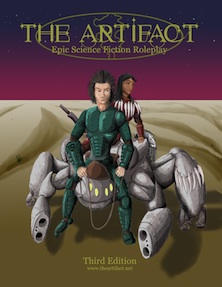Yesterday, we looked at how sharing a character with others can go wrong. I don’t like to leave things on a negative note though. It’s one thing to have a list of don’ts. It’s another to have a useful list of do’s.
So how can we share and have it got well? Like I said last time, people are often willing to hear a GM talk about their games. I’ll add the criteria that they’re willing to listen when said GM is brief and doesn’t delve into all the minutia of their “well laid out” campaign plans. “Let me tell you about my campaign” can be nearly as painful. The important thing is that people listen to the places where characters, players and the campaign intersect. That’s where the sharing is worth while.
What does that mean? That when your character does something in a game, it’s more interesting than anything you planned out on the character sheet. What you planned out on the character sheet may have made it possible for you to do cool things but stick to the action. It’s even more interesting when you ran into something you thought you couldn’t handle and then pulled it off anyway. Emphasize the reason you thought you weren’t going to make it. That’s your hook. That’s how you get your listener to say “I wonder what happened next!”
GMs are used to dealing with hooks, but hooks are something that work when you want to share a story.
Show what it’s like to have your character interact with the other PCs and the GM. Is there a funny conversation you can relate?
Is there a part where your character became pivotal to the campaign? That could be an interesting story too. Is that something the GM planned? Was it something that happened by accident?
You want to focus on the action of the game, it doesn’t have to be the fighting but is should be where something happened. Got the deal you wanted on the new equipment? Didn’t get it? Had a funny interaction with an NPC?
The intersection of the players and the rules can sometimes be interesting, but the feelings you have during those interactions are more important. Rolling two or three perfect rolls in a row is not that significant. The feeling it gave you is. “I rolled three perfect rolls! Do you know what the chances of that are?” is a dull conversation piece. “I rolled three perfect rolls in a row! Do you know how good that felt? It was amazing!” is something that will get even veteran players nodding their head. Positive feelings and energy are infectious.
Some things are just general good conversation rules. Remember shorter is better. Enthusiasm can make us ramble but fight it! Know when the story is done and make it time for someone else to talk. Maybe they’ll ask you to continue, that’s a sign that you’re doing well but again, give room for them to talk if they want to. Or maybe they have to do something and would like the story to end so they can. Give your listener that dignity. They’ll appreciate it.
So tell me your character’s story. Tell me your story. That’s something unique. That’s something entertaining. Lets learn to share so that it’s not just the guys at our table that get to share our experience. Let’s get good at brining in people from outside our gaming group in on the fun we’ve had. Maybe they’ll join you in your next game.



 The Free RPG Blog
The Free RPG Blog